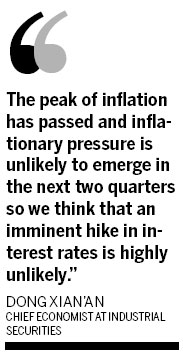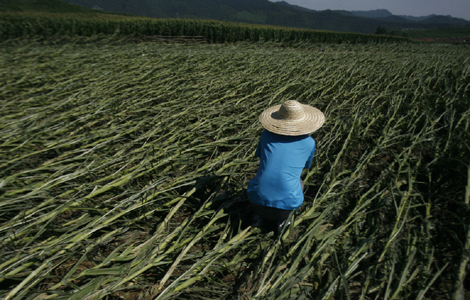Economy
Food stocks on the rise
By Li Xiang (China Daily)
Updated: 2010-08-09 09:24
 |
Large Medium Small |
|
|
BEIJING - Agricultural stocks are likely to be a good bet in the coming quarter on expectation that recent floods will push up food prices and strengthen inflationary pressure in the Chinese economy, analysts said.
China's Consumer Price Index (CPI), a major gauge of inflation, is likely to edge up 3.4 percent year-on-year in July and the surge in prices of agricultural products would be the driver of the overall index, US investment bank Goldman Sachs forecast in a report.
The output of grain harvested this summer fell for the first time in seven years, which heightened concerns that the cut in grain supply will help spur inflation in the economy.

Global wheat futures prices also soared last week to their highest levels in two years after Russia said it would ban grain exports due to a severe drought. Russia's move raised concerns about the global grain supplies and its impact on food prices.
"Investment opportunities would emerge in the agricultural sector in the third quarter given investors' expectations of the rising food prices and more favorable government policies to be released," Shenyin & Wanguo Securities said in a report.
The central government has pledged to encourage agricultural investment and stimulate rural consumption by providing more subsidies to farmers. Analysts said that such favorable policies will help improve profitability of agricultural companies in the long run.
While the general inflationary pressure is rising because of meteorological factors, economists said that China's inflation is likely to have peaked in July and a potential interest rate hike was unlikely as the CPI was expected to moderate in the coming months with the flooding getting less severe.
"The peak of inflation has passed and inflationary pressure is unlikely to emerge in the next two quarters so we think that an imminent hike in interest rates is highly unlikely," said Dong Xian'an, chief economist at Industrial Securities.
The A-share market has rallied by more than 10 percent from this year's low but doubts about the sustainability of the recent rebound arose after domestic lenders were ordered by the banking regulator to conduct stress tests that assume housing prices may drop as much as 60 percent in worst-case scenarios in some cities.
US investment bank JP Morgan Chase & Co said that China stocks may post a "longer and more powerful" rebound but it refrained from calling for a "major turnaround" as policy risks that could hurt company profits still exist.




